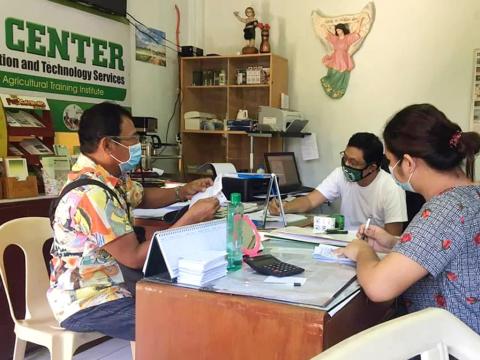Staff of the agriculture office in Pila, Laguna distribute delivery passes to farmers, fishers, dealers, traders, and other agricultural service providers at their FITS Center. (photo by Pila FITS Center)
Farmers’ Information and Technology Services (FITS) Centers and Magsasaka Siyentistas (MS) nationwide are dedicating their resources to help their respective communities despite limitations in mobility this quarantine period.
Agriculture offices in different local government units (LGUs) that operate FITS Centers and partner farmers who serve as MS have opted to continue providing agricultural services amid the ongoing community quarantine measures. This is to help address the needs not only of farming and fishing communities but also of other households in their locality.
Some of these services include the provision of vegetable seeds, distribution of identification cards and quarantine passes to farmers and agricultural workers, and continuous monitoring of farming activities in their respective areas.
In the Cordillera Administrative Region (CAR), agriculture offices are coordinating the transport and marketing of vegetable produce from the local farmers. Some are also assisting in the distribution of relief goods in different barangays.
Likewise, agriculture offices and FITS Centers in CALABARZON continue to allow farmers to access their services while observing safety measures. In Magdalena, Laguna, the FITS Center initially opened their milling facility for rice farmers and offered affordable rice to the locals. Now, their priority is to provide the milling services needed for rice packs that will be distributed to the residents.
In Tanauan, Batangas, which was also affected by the eruption of Taal Volcano, the city agriculture office provided residents with fresh vegetables bought from the local farmers. In General Nakar, Quezon, fresh vegetables were included in the relief packs distributed in the barangays.
In Laguna, FITS Centers in Pangil and Siniloan distributed free vegetable seeds and continue to promote community backyard farming through social media for easy access to nutritious food. Kalayaan FITS Center also opened their doors to residents who want to buy fresh produce from local farmers.
The municipal agriculture office in Remedios T. Romualdez, Agusan del Norte is also set to distribute over 750 packs of 8-in-1 “pinakbet” vegetable seeds to eight barangays and four schools with “Gulayan sa Paaralan” projects this April. This is part of the province’s contingency and recovery plan for COVID-19 for the agriculture sector.
Aside from seed distribution, they will also conduct briefings on urban farming and distribute related information, education, and communication materials from the FITS Center.
Other ongoing and upcoming interventions of the municipal agriculture office are the processing of crop insurance application for farmers affected by rat infestation and distribution of palay seeds and fertilizer to rice farmers not covered by the Rice Competitiveness Enhancement Fund. At present, they are operating on a four-day work week and are mostly coordinating rice harvest activities of the local farmers.
“We are now at the peak of harvest season, so farmers are getting in touch with us most of the time. [If we don’t assist them], what will the farmers eat?” municipal agriculturist and FITS Center manager Maria Nenita Daohog said in an interview.
Agricultural and FITS staff in Remedios T. Romualdez are also directed to be part of the local workforce manning the checkpoints in the area. This is also the case in some agriculture offices in other parts of the country.
In Davao Region, some MS are also helping out in their own way. Benjamin Lao of Bansalan, Davao del Sur offers free delivery services for customers of their farm. Some of the products they sell include organic vegetables, chicken, goat’s milk, and processed goods like turmeric tea and coco sugar.
In Guimaras, Rebecca Tubongbanua, MS of the provincial FITS Center, provided five boxes of calamansi juice for frontline workers in the area. This was done last March 24, through her company McNester Food Products.
The FITS Center and MS are components of the Techno Gabay Program which serves as one of the modalities of the Agricultural Training Institute in bringing extension services in the countryside.
With the initiatives of these institutions and individuals during this quarantine period, Bayanihan efforts in the different communities are expected to grow and reach more Filipinos.

